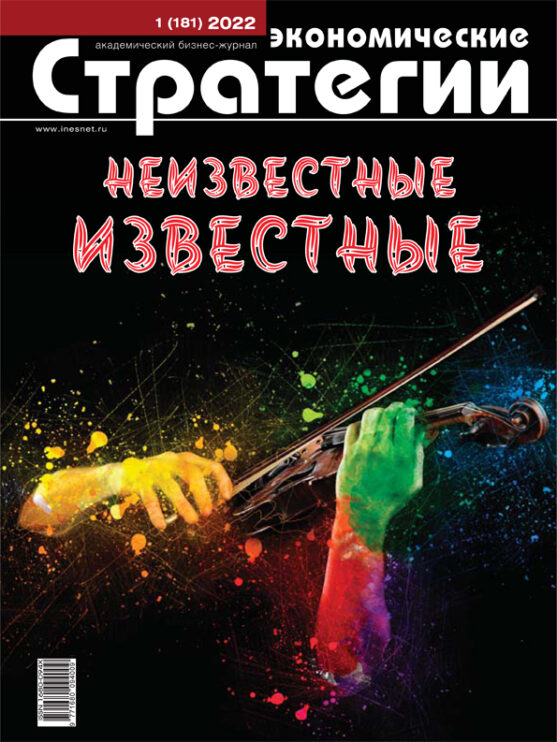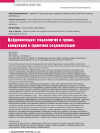Digitalization: Sociology and Law, Concept and Practice of Socialization
DOI: https://doi.org/10.33917/es-1.181.2022.6-19
The article highlights the short history of the Russian and world digitalization in details, focusing on the identified problems and priorities, which must be resolved if to successfully build and further effectively function information society in all its aspects.
The theoretical part has formed important opinions and ideas about the topic under study and shows that the spread of digital technology in all spheres of life is evidence of an active stage in the transition of human civilization from an industrial development stage to a digital one with social reality relevant to it. An analysis to identify the process of digitalizing human civilization’s linear development vector based on creating an indicative planning system allowed the author to conclude that there is a long-awaited transition to a purposeful scientific management of society and the state.
As it follows from the title of the article, legal coverage and all-round socialization are dominant in providing a successful solution to many challenges of digitalization. Russia’s political class is fully aware of the need to develop legal provisions, which are able to successfully prevent and mitigate possible threats to information society. It is primarily about the data breach related to both the functioning of the State and corporate/personal data. But the proposed draft legal acts of various kinds do not provide enough insight into how these protective, desirably preventive measures will be globally and nationally ensured.
Digitalization offers great opportunities for a rapid economic and social recovery to society. Developing information and communication technology gives an unprecedented rise in productivity, creates new forms of work organization, ensures conditions for increased trade in goods and services, offers infinite possibilities for education, communication between representatives of various societies and cultures, community commitment and network. The challenges of digitalization are so complicated that they do not seem possible to be solved by legal precedents without enhancing the population’s moral upbringing. The efforts of the really responsible citizens, the users of digital technology, the Internet initially can only effectively confront a new global digital environment in which there are opportunities to act rather immorally while at the same time anonymously and with impunity. We shall have to act gradually, but as strict as possible in the domestic and international legalization of the “digital environment”, paying a special attention to its moral dimension and the creation of particular barriers for ethical violations.
Источники:
1. Moiseev N.N. S myslyami o budushchem Rossii [Thinking About the Future of Russia]. Moscow, Fond sodeistviya razvitiyu sotsial’nykh i politicheskikh nauk, 1997, pp. 59–60.
2. Pochemu Mask ne da Vinchi. Kasperskaya — o tsifrovom kontrole i “kloune” iz SShA [Why Musk is not da Vinci. Mrs Kaspersky — About Digital Control and the “Clown” from the USA]. Argumenty i fakty, 2021, June, 25, available at: https://aif.ru/society/web/pochemu_mask_ne_da_vinchi_kasperskaya_-_o_cifrovom_kontrole_i_kloune_iz_ssha.
3. Osipov G.V., Klimovitskii S.V. Tsifrovizatsiya obshchestvennoi zhizni i novye zadachi sotsial’nykh nauk [Digitization of Social Life and New Tasks of Social Sciences]. Gumanitarnye, sotsial’no-ekonomicheskie i obshchestvennye nauki, 2018, no 5, pp. 54–59.
4. Klimovitskii S.V., Osipov G.V. Vliyanie tsifrovizatsii ekonomiki na rynok truda [Impact of Digitization of the Economy on the Labour Market]. Gumanitarnye, sotsial’no-ekonomicheskie i obshchestvennye nauki, 2019, no 4, pp. 212–216.
5. Novaya sotsial’naya real’nost’: sistemoobrazuyushchie faktory, bezopasnost’ i perspektivy razvitiya. Rossiya v tekhnosotsial’nom prostranstve: Kollektivnaya monografiya [New Social Reality: Backbone Factors, Security and Development Prospects. Russia in Techno-social Space: Collective Monograph]. Moscow, Saint Petersburg, Nestor-Istoriya, 2020, pp. 22–23.
6. Melikova N.D. Vliyanie Interneta na psikhiku detei [The Influence of the Internet on Children’s Mental Health]. Universum: Psikhologiya i obrazovanie: elektron. nauchn. zhurn, 2015, no. 11–12.
7. V Yuzhnoi Koree semeinaya para geimerov osuzhdena za ubiistvo novorozhdennoi docheri [Gamer Couple in South Korea was Convicted of Murdering Their Newborn Daughter]. NEWru.com, available at: https://www.newsru.com/hitech/31may2010/krgamers.html.
8. Pais A. Nauchnaya deyatel’nost’ i zhizn’ Al’berta Einshteina [Scientific Work and Life of Albert Einstein]. Moscow, Nauka, 1989, 196 p.
9. Bauman Z. Intimations of Postmodernity. New York, 1992, p. 102.
10. Osipov G.V., Klimovitskii S.V. Virtualizatsiya sotsial’noi real’nosti i fal’shivye novosti [Virtualization of Social Reality and False News]. Gumanitarnye, sotsial’noekonomicheskie i obshchestvennye nauki, 2018, no. 5, pp. 54–59.
11. Patrushev predupredil o popytkakh Zapada razrushit’ rossiiskie dukhovno-nravstvennye tsennosti [Patrushev Warned of Western Attempts to Destroy Russian Spiritual and Moral Values]. Interfaks, 2021, March, 23, available at: https://www.interfax.ru/russia/757345.
12. Tsifrovaya karma: kak budet rabotat’ sistema sotsial’nogo kredita v Kitae [Digital Karma: How the Social Credit System will Work in China]. RBK, 2021, July, 8, available at: https://trends.rbc.ru/trends/social/60e5ca569a7947a00440ba11.
13. Virus pobedim, a slezhku — net [We will Defeat the Virus, but not Surveillance]. Kommersant”, 2020, April, 15, available at: https://www.kommersant.ru/doc/4322794.
14. Dannye — eto novoe toplivo: kto i zachem sledit za vami [Data is the New Fuel: Who and Why is Tracking You]. Gazeta.ru, 2019, February, 10, available at: https://www.gazeta.ru/tech/2019/02/09/12158017/not_our_data.shtml.
15. Kiberprestupnost’ nanesla mirovoi ekonomike ushcherb v 1 trln dollarov [Cybercrime has Caused Losses to the Global Economy Amounting to Trillion]. Zhurnal PLAS, 2020, December, 14, available at: https://plusworld.ru/daily/cat-security-and-id/kiberprestupnost-nanesla-mirovoj-ekonomike-ushherbv-1-trln-dollarov/
16. Kiberprestupnost’. Modul’ 1: Vvedenie v kiberprestupnost’ [Cybercrime. Module 1: Introduction to Cybercrime]. The United Nations Organization, UN Office on Drugs and Crime UN Office on Drugs and Crime, Vena, 2019, p. 9.
17. Kiberprestupnost’. Modul’ 2: Osnovnye vidy kiberprestupnosti [Cybercrime. Module 2: Main Types of Cybercrime]. The United Nations Organization, UN Office on Drugs and Crime, Vena, 2019, pp. 5–25.
18. Gorelik G. Sakharov, “tainstvennyi i zagadochnyi” [The Mystery Sakharov]. Troitskii variant, 2021, no. 329, available at: https://trv-science.ru/2021/05/saxarov-tainstvennyj-i-zagadochnyj/
19. Chistilin D.K. Vtoraya volna krizisa 2012–2013 godov, ili Sistemnye oshibki makroekonomicheskoi politiki Ukrainy i Rossii [The Second Wave of 2012–2013 Crisis, or System Errors in Macroeconomic Policy of Ukraine and Russia]. Ekonomicheskie strategii, 2013, no. 8, pp. 33.
20. Merezhko A. Sotsiologiya prava N.S. Timasheva [N.S. Timashev’s Sociology of Law]. Odessa, 2012, p. 149.
21. Talapina E.V. Evolyutsiya prav cheloveka v tsifrovuyu epokhu [Evolution of Human Rights in the Digital Era]. Trudy Instituta gosudarstva i prava RAN, 2019, vol. 4, no, 3, pp. 122–146.
22. Anisimova A.S. Pravovoe regulirovanie Interneta: osnovnye probely i napravleniya deyatel’nosti gosudarstva [Legal Regulation of the Internet: Major Gaps and Areas of Activity for the State]. Yuridicheskii vestnik DGU, 2020, no. 1, pp. 149–153.
23. Kurbaliiya I. Upravlenie Internetom [Internet Governance]. Moscow, 2010, p. 163.
24. Dmitrik N.A. Osushchestvlenie sub”ektivnykh grazhdanskikh prav s ispol’zovaniem seti Internet [Using the Internet When Exercising Subjective Civil Rights]. Moscow, 2006, p. 72.
25. Kasenova M.B. Problemy pravovogo regulirovaniya transgranichnogo ispol’zovaniya Interneta [Legal Regulation Problems of Cross–border Using the Internet]. Moscow, 2015, p. 148.
26. Talapina E.V. O vozmozhnostyakh pravovogo regulirovaniya Interneta [Possibilities of the Law Governing the Internet]. Trudy Instituta gosudarstva i prava RAN, 2016, no. 3, pp. 57–75.
27. Myunkhenskaya konferentsiya po bezopasnosti — 2020 [Munich Security Conference 2020]. TASS, available at: https://tass.ru/myunhenskaya-konferenciyapo-bezopasnosti-2020.



